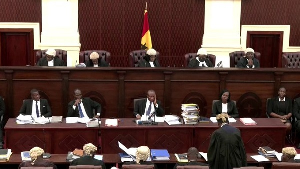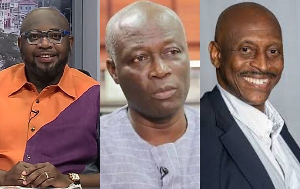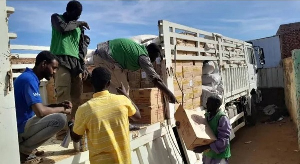By Carly Vincent Ahiable
Economic experts and analysts have agreed that the cedi can be saved from total collapse provided the new government of the New Patriotic Party (NPP) has the political will to act quickly and institute credible programmes to correct the distortions that have drained the economy. The election is over and the electorate looks up to the incoming government to stop the fall of the cedi and to create a good business environment.
The falling cedi has become a source of worry to many Ghanaians and politicians. The local currency went through adjustments in the currency market to accommodate pressures on the economy.
Some economic experts believe that to address the problem there is the need to identify the sources of the internal pressure, which include rapid rise in domestic expenditures as well as a growing speculative demand for foreign exchange. The Accra Mail spoke to a number of economists and financial analysts on how the new government can tackle the deteriorating exchange rate. Professor Ernest Aryeetey, Deputy Director of the Institute of Statistical, Social and Economic Research (ISSER), University of Ghana, Legon, says there is no credible short-term solution to the exchange rate problem which does not take into account the broader issues of national economic management.
In his view, "while there are obvious short term solutions including the fixing of the exchange rate which is probably the easiest but potentially costly thing to do, they are not likely to lead to a stable situation beyond that short term". He explained that there would be a dead-end screenplay once the resources used to defend the short-term measures have run out. "The solution to the exchange rate crisis lies in a more comprehensive framework of national economic management.
The exchange rate policy will have to be part of a broader set of policy improvements that target the monetary and fiscal sectors of the economy and seek to manage effectively both the demand and supply of foreign exchange, and other resources. "If you want to stabilise the nominal value of the cedi, you also want to keep domestic prices down. You certainly want to avoid a situation where you fix the value of the cedi and then cannot do anything about inflation," he said. Professor Aryeetey explained that the government cannot keep inflation low if it wants to increase spending and use the banking system to finance that increased expenditure, adding that, "applying a managed regime can be effective only if the appropriate policy environment is developed."
That, he said could be done if there is significant consensus among all economic agents in order to contain the pressures that lead government to take poor policy decisions in the short-term. He emphasised that, "there is no doubt that there is a large speculative demand for foreign exchange. Therefore, the appropriate steps will have to be taken to remove or minimise the speculative demand. We expect the government to take measures that will restore confidence in the economy. The government must spend less and improve upon reserves." Mr. Frank Aning, Senior Analyst at Data Bank, a stock brokerage in Accra said that the weak cedi could partly be explained by the astronomical increase in imports without sufficient inflows (receipts from exports, transfers from abroad and donor support) to balance expenditure. This, he said, in a way created many problems for the local currency. He believes that, as the Christmas is over there is the tendency for a general reduction in imports.
"This marginal reduction should set the stage towards helping to reduce the rate of depreciation." Mr. Aning said that the major cocoa season that started in September last year would also generate some inflows and hopes that a combination of these factors in the short term, "should prop up the cedi and reduce the rate of depreciation." That, he said, would be based mainly on the economic policy of the incoming government. Mr. Aning suggested that the new government should curtail the importation of certain non-essential commodities by imposing special taxes to reduce pressure on foreign currency demand.
He implores the government of the New Patriotic Party to implement credible economic programmes to be able to win the confidence of international donors. "I don’t expect a decrease in donor assistance provided the new regime implements the right economic programmes," he said. Mr. Ludwing Atsunyo, an analyst from SDC Brokerage Services Limited told The Accra Mail that "it is necessary that the new government should control imports and take a bold step to implement policies that will encourage the development of the non-traditional exports. "We must try to refine some of our export produce especially cocoa and timber by adding value to them," he said.
Commenting on the prices of crude oil and its impact on the economy, Mr. Atsunyo said it is imperative that the government increase fuel prices to reflect the current price of oil which is a prime mover of the economy. He explained that when winter ends the price of crude oil would fall which would necessitate a downward adjustment for a balance in the short term. Hear him, "it is likely that after the second quarter prices of crude oil will fall steeply and the government will respond to the market forces by adjusting the price of petrol downward."
He is optimistic about the economic prospects that await Ghanaians under the new political order. He said that last year SDC Brokerage Services conducted a research that revealed that many investors have adopted a ‘wait and see’ attitude. "Investors will no longer hold back their money since the country is able to go through a smooth change of government," he said. Mr. Maxwell Oteng, a Ghanaian residence in Santa Cruz, USA in his writing published on the Internet posed the question: to what extent can the cedi be allowed to depreciate and what level of exchange rate reflects the economic fundamentals of the country? These, he says, are hard questions that require answers from a lot of studies.
He warned that relying on devaluation alone to promote exports might not be effective, especially for a country like Ghana that exports primary commodities whose demand is low and face severe competition even from synthetic substitutes. Mr. Oteng explained that it might take the support of other policies and concrete incentives such as export subsidies to exporters who put value to their products before export.
"The government must implement programmes for a gradual globalisation of imports, and the maintenance of positive interest rates and low inflation to encourage savings and discourage investment in unproductive ‘inflation hedges’ and speculative activities," he advised. He says that so long as the government takes the path of floating exchange rate nothing or very little can be done to arrest the decline in the value of the cedi in the short-term. The Bank of Ghana needs to improve its reserves to intervene in the foreign exchange market.
According to Mr. Oteng, in the long run Ghana’s only hope in stabilising the cedi is through a sound macro-economic management that will deal with inflation and a cut in government spending. Mr. Philip Sarpong, an economic analyst from tmi Consulting Limited, an Accra-based company that sources funds for small and medium scale enterprises says one way to stop the depreciation of the cedi is to stop the importation of certain goods such as used foreign newspapers. He said such goods do not significantly add to our national output because they are used as wrappers for which we have good substitutes.
He explained that those who import such items siphon the foreign exchange out of the country without creating a corresponding real output. The Accra Mail also contacted the Shadow Minister for Finance of the NPP, Dr. Kofi Apraku to get his comments but he said until next week he would not be in a position to state the party’s position on steps to be taken to strengthen the local currency. Attempts to get the Centre for Policy Analysis (CEPA) to state its position proved futile.
Dr. Jebuni in a telephone conversation with The Accra Mail said he was too busy to comment. He said that the staff is not yet back from the Christmas holidays and hoped that by next week their position would be stated. Meanwhile business has started throughout the country after a week-long break that saw the celebration of Christmas and the Muslim Eid ul-Fitr as well as a run-off of the presidential election that produced a new president and political leadership.
Click to view details



Business News of Monday, 8 January 2001
Source: Accra Mail
















